-
 Bitcoin
Bitcoin $76,668.4421
-2.61% -
 Ethereum
Ethereum $1,470.4272
-5.48% -
 Tether USDt
Tether USDt $0.9997
0.01% -
 XRP
XRP $1.8226
-4.10% -
 BNB
BNB $549.6664
-0.78% -
 USDC
USDC $0.9999
-0.01% -
 Solana
Solana $104.0810
-2.58% -
 TRON
TRON $0.2312
1.51% -
 Dogecoin
Dogecoin $0.1429
-3.57% -
 Cardano
Cardano $0.5645
-2.20% -
 UNUS SED LEO
UNUS SED LEO $8.9923
0.76% -
 Toncoin
Toncoin $2.9338
-3.36% -
 Chainlink
Chainlink $10.9082
-4.24% -
 Stellar
Stellar $0.2226
-3.92% -
 Avalanche
Avalanche $16.3666
-3.07% -
 Shiba Inu
Shiba Inu $0.0...01075
-5.43% -
 Hedera
Hedera $0.1501
1.11% -
 Sui
Sui $1.9375
-4.25% -
 MANTRA
MANTRA $6.1422
-2.18% -
 Polkadot
Polkadot $3.4442
-4.68% -
 Dai
Dai $1.0001
0.02% -
 Bitcoin Cash
Bitcoin Cash $269.5550
-2.17% -
 Litecoin
Litecoin $68.5837
-3.51% -
 Ethena USDe
Ethena USDe $0.9988
0.02% -
 Bitget Token
Bitget Token $4.0080
-1.74% -
 Pi
Pi $0.5600
-4.25% -
 Monero
Monero $198.4728
-0.78% -
 Hyperliquid
Hyperliquid $10.8363
-2.45% -
 Uniswap
Uniswap $4.9087
-3.82% -
 OKB
OKB $48.9891
-4.48%
How does NFT Regulation affect the future development of the NFT market?
NFT market growth hinges on balancing innovation with responsible regulation. Varying jurisdictional approaches create uncertainty, impacting creators, buyers, and platforms. Consumer protection, tax clarity, and anti-money laundering measures are key regulatory focuses.
Mar 03, 2025 at 06:37 am
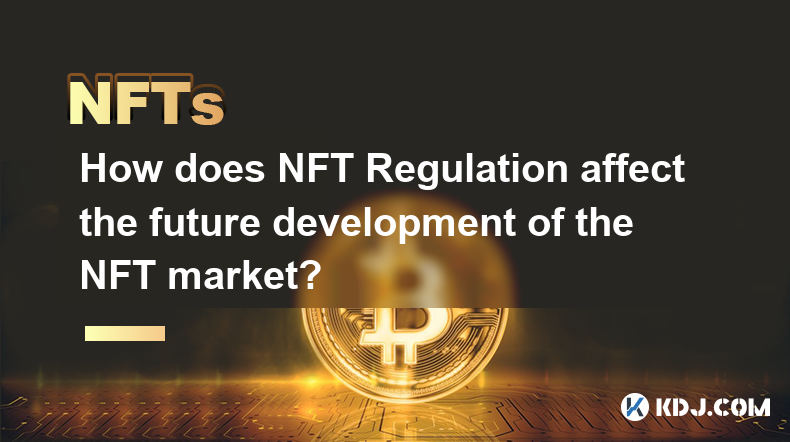
Key Points:
- NFT regulation varies significantly across jurisdictions, creating uncertainty for creators, buyers, and platforms.
- Regulatory focus areas include consumer protection, tax compliance, money laundering prevention, and intellectual property rights.
- Increased regulation could stifle innovation but also enhance market trust and stability.
- Self-regulation within the NFT community is also crucial for sustainable growth.
- The future of NFT development hinges on finding a balance between fostering innovation and implementing responsible regulatory frameworks.
How Does NFT Regulation Affect the Future Development of the NFT Market?
The burgeoning NFT market, while brimming with creative potential and financial opportunity, faces a significant challenge: regulation. The lack of a unified global regulatory framework creates uncertainty and impacts its future trajectory. Different jurisdictions are approaching NFT regulation from various angles, resulting in a complex and fragmented landscape. This uncertainty affects creators, buyers, and the platforms facilitating NFT transactions.
One major area of regulatory concern is consumer protection. Many NFT projects have been plagued by scams and rug pulls, leaving investors with significant losses. Regulations aimed at protecting consumers from fraudulent activities, such as requiring greater transparency in project disclosures and stricter anti-fraud measures, are likely to emerge. This could involve stricter licensing requirements for NFT marketplaces and creators.
Taxation is another key area demanding regulatory clarity. The tax implications of buying, selling, and trading NFTs are currently unclear in many regions. Governments worldwide are grappling with how to classify NFTs for tax purposes, whether as collectibles, securities, or something else entirely. Consistent and predictable tax rules are essential for the long-term health of the NFT market. Ambiguity currently discourages wider adoption.
Money laundering and financial crime represent another significant regulatory hurdle. The pseudonymous nature of some blockchain networks allows for illicit activities. Regulations may focus on implementing Know Your Customer (KYC) and Anti-Money Laundering (AML) compliance measures within NFT marketplaces. This may necessitate increased transparency in transaction details, potentially compromising the privacy some value in blockchain technology.
Intellectual property rights (IPR) are another crucial aspect of NFT regulation. Questions around ownership, licensing, and the potential for infringement are still being debated. Regulations clarifying the legal framework around NFT ownership and the use of underlying intellectual property are essential for fostering trust and encouraging creators to engage with the NFT space. The current ambiguity deters many artists and brands from fully embracing the technology.
The impact of increased regulation on the future development of the NFT market is complex. While stricter rules could curb innovation and increase compliance costs, they could also enhance market trust and attract institutional investors. A balance is needed – a regulatory framework that protects consumers and prevents illicit activities without stifling creativity and innovation. Overly stringent regulations could stifle the very dynamism that makes NFTs attractive.
Self-regulation within the NFT community also plays a crucial role. Industry initiatives promoting ethical practices, transparency, and standards can help mitigate risks and build confidence in the market. This includes developing best practices for project development, disclosure, and community engagement. A collaborative approach between regulators and the NFT community is vital to creating a sustainable ecosystem.
The development of standardized NFT marketplaces and platforms could streamline regulatory compliance. Platforms incorporating built-in KYC/AML processes and providing clear information about the legal status of NFTs could enhance market integrity and reduce regulatory hurdles. This could make it easier for regulators to oversee the market and for creators to comply with the law. This standardization could lead to broader adoption.
Furthermore, the evolution of NFT technology itself could influence the regulatory landscape. The development of more privacy-preserving blockchain technologies, for instance, could mitigate some of the concerns around money laundering and illicit activities. Similarly, improvements in digital rights management (DRM) technology could help clarify issues related to intellectual property rights. Technological advancement will influence the future direction of regulation.
Common Questions and Answers:
Q: Will NFTs be regulated like securities?
A: The classification of NFTs as securities is a complex issue varying by jurisdiction. Whether an NFT is a security depends on its specific characteristics and how it's marketed. Regulations are still evolving, and there's no universal answer.
Q: How will NFT regulation impact artists?
A: Regulation could impact artists positively and negatively. Stronger consumer protection could benefit artists by preventing scams and ensuring fair compensation. However, increased compliance costs and licensing requirements might present challenges for smaller artists.
Q: What is the role of self-regulation in the NFT market?
A: Self-regulation plays a crucial role in establishing trust and best practices. Industry groups and platforms are developing guidelines for ethical conduct, transparency, and consumer protection, supplementing government regulations.
Q: How will international differences in NFT regulation affect the market?
A: Different jurisdictions' differing regulatory approaches create a fragmented and complex market. This makes it difficult for creators and businesses to operate globally and could hinder innovation and growth. Harmonization of regulatory frameworks is a significant challenge.
Q: What are the potential consequences of inadequate NFT regulation?
A: Inadequate regulation could lead to increased scams, market manipulation, and a loss of investor confidence, ultimately hindering the long-term growth and adoption of NFT technology. This could also create legal uncertainty and deter creators and businesses from entering the market.
Disclaimer:info@kdj.com
The information provided is not trading advice. kdj.com does not assume any responsibility for any investments made based on the information provided in this article. Cryptocurrencies are highly volatile and it is highly recommended that you invest with caution after thorough research!
If you believe that the content used on this website infringes your copyright, please contact us immediately (info@kdj.com) and we will delete it promptly.
- U.S. Securities and Exchange Commission (SEC) Closes Its Investigation into Immutable X (IMX) Without Providing an Explanation
- 2025-04-09 00:50:12
- Solaxy Price Prediction – As Solana’s First Layer-2 Scaling Solution, SOLAXY Might Speed Up Transactions and Cut Fees
- 2025-04-09 00:50:12
- Troller Cat ($TCAT): The Next Big Meme Coin?
- 2025-04-09 00:45:12
- JA Mining cloud mining will help you easily mine Bitcoin in 2025
- 2025-04-09 00:45:12
- Chainlink (LINK) May Enter a Bullish Trend Within the Next One to Two Weeks
- 2025-04-09 00:40:12
- Charles Hoskinson to Moderate a Panel Discussion Featuring Donald Trump Jr.
- 2025-04-09 00:40:12
Related knowledge
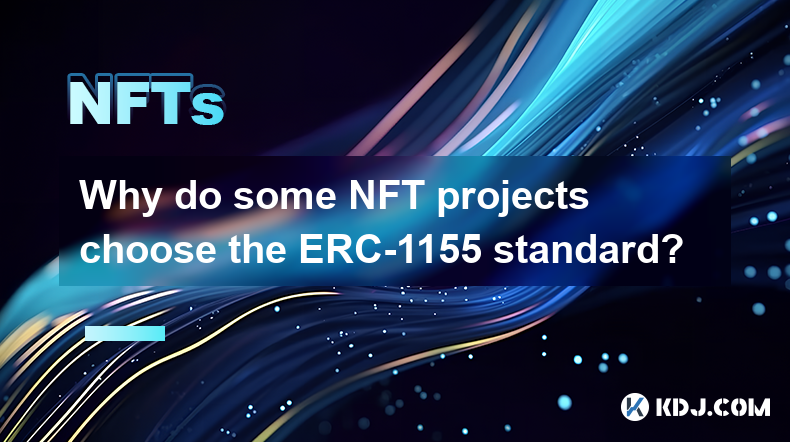
Why do some NFT projects choose the ERC-1155 standard?
Apr 08,2025 at 11:49am
The world of Non-Fungible Tokens (NFTs) has seen a significant rise in popularity and innovation, leading to the development of various token standards. Among these, the ERC-1155 standard has emerged as a versatile and efficient choice for many NFT projects. This article delves into the reasons why some NFT projects opt for the ERC-1155 standard, explor...
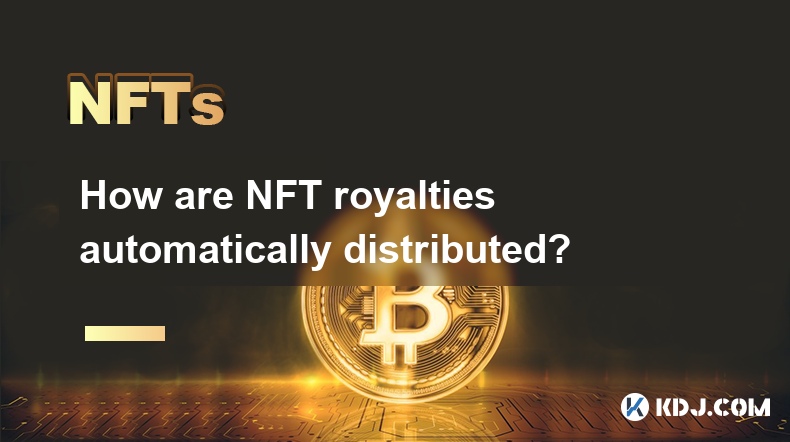
How are NFT royalties automatically distributed?
Apr 08,2025 at 08:14pm
NFTs, or Non-Fungible Tokens, have revolutionized the digital art and collectibles market by providing a way to prove ownership and authenticity of digital assets. One of the most intriguing features of NFTs is the ability to automatically distribute royalties to creators whenever their work is resold. This article will delve into the mechanisms behind ...
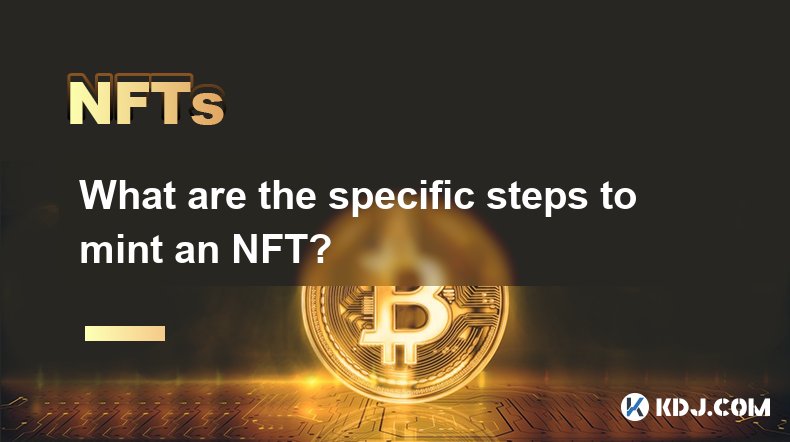
What are the specific steps to mint an NFT?
Apr 08,2025 at 05:22pm
Introduction to NFT MintingMinting an NFT, or Non-Fungible Token, involves creating a unique digital asset on a blockchain. This process allows artists, creators, and collectors to tokenize their work, ensuring its authenticity and ownership. Understanding the steps to mint an NFT is crucial for anyone looking to enter the world of digital collectibles....
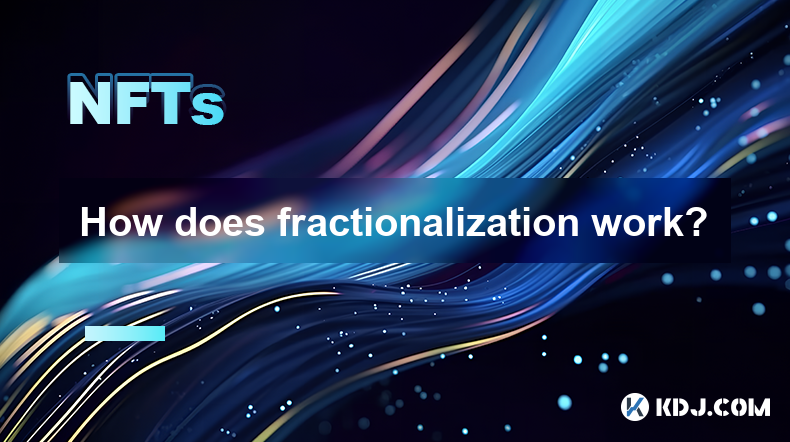
How does fractionalization work?
Apr 08,2025 at 07:42pm
How does fractionalization work? Fractionalization in the context of cryptocurrencies and blockchain technology refers to the process of dividing a single asset into smaller, more manageable pieces. This concept has revolutionized the way investors and users interact with high-value assets, making them more accessible and liquid. In this article, we wil...
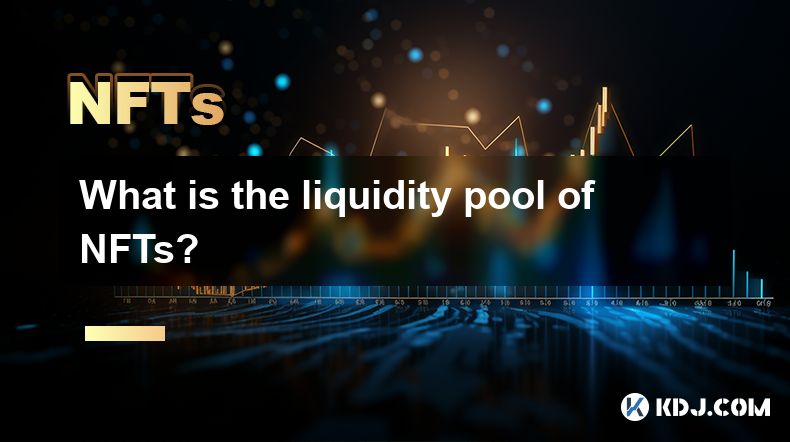
What is the liquidity pool of NFTs?
Apr 08,2025 at 05:35pm
The concept of liquidity pools has become increasingly popular within the cryptocurrency and decentralized finance (DeFi) ecosystems. While traditionally associated with token swaps, the idea has extended to the realm of Non-Fungible Tokens (NFTs). Liquidity pools for NFTs are mechanisms that facilitate the trading and exchange of these unique digital a...
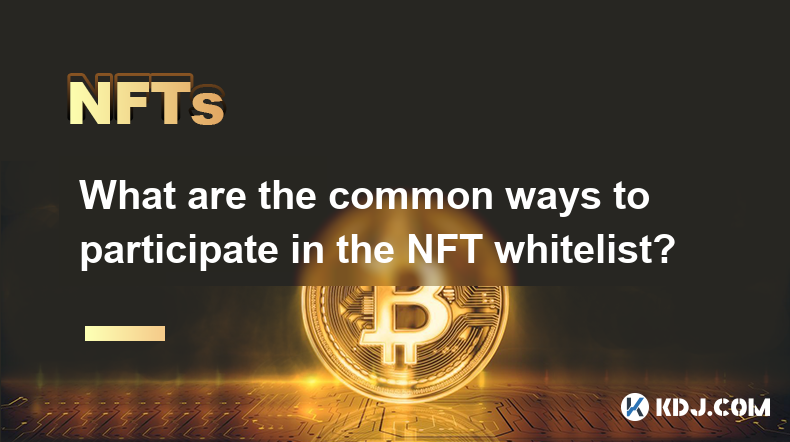
What are the common ways to participate in the NFT whitelist?
Apr 08,2025 at 08:28pm
Participating in an NFT whitelist can be an exciting opportunity for enthusiasts and investors looking to secure their spot in upcoming NFT drops. The whitelist often grants early access or special privileges, such as lower minting fees or guaranteed allocations. Here, we will explore the common ways to participate in an NFT whitelist, detailing each me...

Why do some NFT projects choose the ERC-1155 standard?
Apr 08,2025 at 11:49am
The world of Non-Fungible Tokens (NFTs) has seen a significant rise in popularity and innovation, leading to the development of various token standards. Among these, the ERC-1155 standard has emerged as a versatile and efficient choice for many NFT projects. This article delves into the reasons why some NFT projects opt for the ERC-1155 standard, explor...

How are NFT royalties automatically distributed?
Apr 08,2025 at 08:14pm
NFTs, or Non-Fungible Tokens, have revolutionized the digital art and collectibles market by providing a way to prove ownership and authenticity of digital assets. One of the most intriguing features of NFTs is the ability to automatically distribute royalties to creators whenever their work is resold. This article will delve into the mechanisms behind ...

What are the specific steps to mint an NFT?
Apr 08,2025 at 05:22pm
Introduction to NFT MintingMinting an NFT, or Non-Fungible Token, involves creating a unique digital asset on a blockchain. This process allows artists, creators, and collectors to tokenize their work, ensuring its authenticity and ownership. Understanding the steps to mint an NFT is crucial for anyone looking to enter the world of digital collectibles....

How does fractionalization work?
Apr 08,2025 at 07:42pm
How does fractionalization work? Fractionalization in the context of cryptocurrencies and blockchain technology refers to the process of dividing a single asset into smaller, more manageable pieces. This concept has revolutionized the way investors and users interact with high-value assets, making them more accessible and liquid. In this article, we wil...

What is the liquidity pool of NFTs?
Apr 08,2025 at 05:35pm
The concept of liquidity pools has become increasingly popular within the cryptocurrency and decentralized finance (DeFi) ecosystems. While traditionally associated with token swaps, the idea has extended to the realm of Non-Fungible Tokens (NFTs). Liquidity pools for NFTs are mechanisms that facilitate the trading and exchange of these unique digital a...

What are the common ways to participate in the NFT whitelist?
Apr 08,2025 at 08:28pm
Participating in an NFT whitelist can be an exciting opportunity for enthusiasts and investors looking to secure their spot in upcoming NFT drops. The whitelist often grants early access or special privileges, such as lower minting fees or guaranteed allocations. Here, we will explore the common ways to participate in an NFT whitelist, detailing each me...
See all articles






















































































